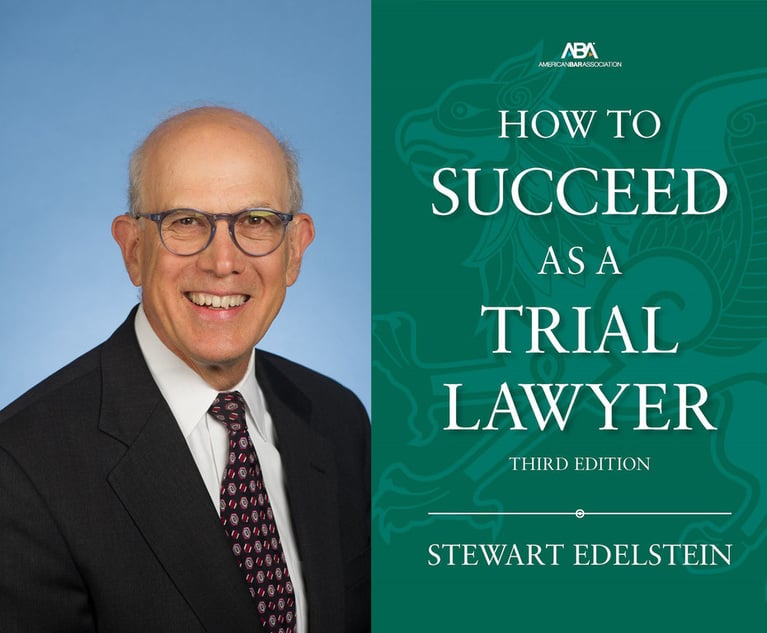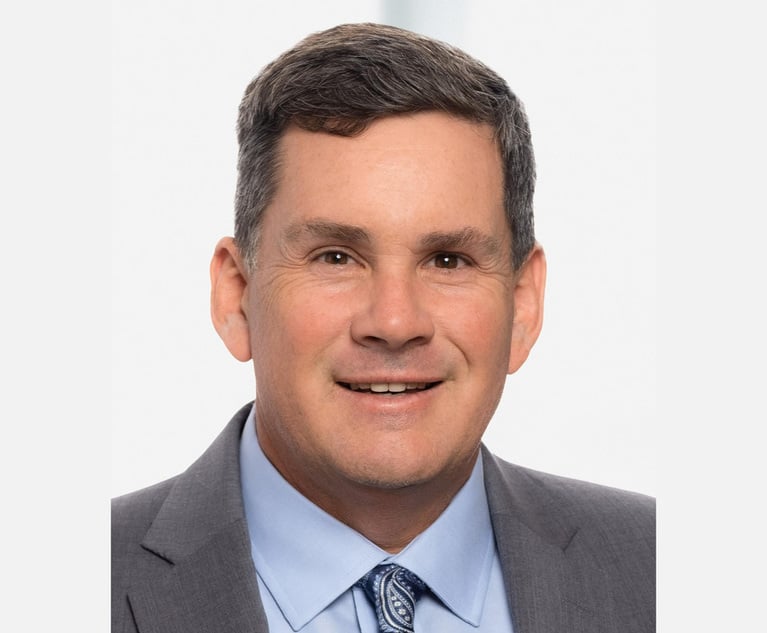 Steven Toll of Cohen Milstein
Steven Toll of Cohen MilsteinLitigation Leaders Across the 'v': Cohen Milstein's Steven Toll on Fearless Litigation, Defense-Side Competition and the Greater Good
'When defendants see us on the other side, they know they're in for a hard-fought and, if necessary, drawn-out battle.'
December 01, 2019 at 10:32 PM
10 minute read
Welcome to an occasional spin-off of our "Litigation Leaders" series, "Across the 'v,'" featuring the leaders of top plaintiffs-side firms.
We begin with Steven Toll, the managing partner of Cohen Milstein Sellers & Toll, who also serves as co-chair of the firm's securities litigation and investor protection practice group.
Lit Daily: Tell us a little about yourself—beyond what's in your law firm bio.
Steven Toll: As a law student, I never imagined I would become a plaintiffs' securities class action lawyer—in part, because I was not familiar with class actions. I started out with the Federal Home Loan Bank Board, representing the government in cases brought against savings and loan executives. Eventually, I decided I wanted to move into private practice, and I was hired by Cohen Milstein, a firm that focused almost exclusively on plaintiffs' class actions, which was starting to blossom at that time.
The firm has grown a great deal over my 40 years, but throughout it all, I've been able to do what I love: protect citizens, employees, shareholders, and small businesses against corporate malfeasance.
Outside of my role with Cohen Milstein, I enjoy being active in politics and supporting Democratic candidates nationwide and in Virginia, where I reside with my wife. I've also developed an interest in the entertainment field, and been involved with several movie and theater projects, including Hamilton, a Broadway production with Sting called "The Last Ship," and a powerful documentary about the 1921 Tulsa race riot. I was also one of the executive producers of the Broadway play, and now Netflix movie, "American Son," starring Kerry Washington. At the community-level, I'm passionate about basketball and charitable work with Children's National Hospital in Washington, D.C.
What's the history of your firm? When/ why/ how did it come into existence?
Cohen Milstein—at least as it's known today—began in 1986 following the spin-off of the D.C. office of a leading Philadelphia-based firm [Kohn, Savett,Marion & Graf]. At the time it was me, Jerry Cohen and Herb Milstein, along with a handful of other lawyers. In 1997, we brought on Joe Sellers to lead our Civil Rights & Employment practice, which has brought some of the most important civil rights and employment cases in the country.
In 1986, the firm had nine people in one office. Today, we're more than 10 times that size, with six offices across the country. We didn't plan to scale in this way; our plan was simply to pursue challenging work and provide the best legal services possible. I believe our growth speaks to the character of the lawyers in the firm—people heard about our work and approached us to take on increasingly bigger and more complex cases. It's our reputation that's driven us forward and allowed us to grow opportunistically.
How big is the firm and where are most of your litigators concentrated geographically?
We have over 100 lawyers in six offices across the country: Chicago, New York, Palm Beach Gardens (Florida), Philadelphia, Raleigh and Washington, D.C. Roughly two-thirds of our lawyers are based in our D.C. office.
What areas of litigation do you specialize in? Has this evolved over the years?
One of the attributes we believe distinguishes us is the breadth of our expertise. We've long been known for our work in antitrust, civil rights and employment, and securities litigation. We've also built a stellar reputation in areas such as complex torts, where we're serving as co-lead counsel in the Flint Water Crisis litigation; consumer protection, where we've played a leading role in the Anthem Data Breach litigation and a number of other high-profile privacy-related class actions; ERISA, where one of our cases—Thole v. U.S. Bank—is currently before the Supreme Court; and public client, where we represent several states and have played a leading role in the opioids litigation.
What do you see as hallmarks of your firm's litigators? What makes you different?
I believe we're recognized as formidable, but respectful litigators. We've built a reputation for taking on—and defeating—powerful opponents. The judge in one of our recent cases summed it up this way: "[P]eople who run corporations are generally deterred by the fact that there are the … Cohen Milsteins out there."
Though we litigate vigorously, we do so professionally—an approach that, I believe, is recognized and appreciated by both opposing counsel and the bench.
Something else that sets us apart is our commitment to the 'greater good.' One of my favorite quotes about the firm—and one that I think rings true—describes us as, "The most effective law firm in the United States for lawsuits with a strong social and political component." People join—and elect to spend their careers at—Cohen Milstein because we are committed to furthering causes greater than ourselves.
In recent months, we've been hearing about big defense-side firms making an effort to take on more work representing plaintiffs. What's your reaction? Are you concerned about the competition?
No, we're not concerned. We wish them well; but, truthfully, we haven't seen many defense-side firms get into the plaintiffs' class action field. Should that change, we'll welcome the additional resources devoted to the causes for which we've been fighting for years.
How many lateral lawyers have you hired in the last 12 months? What do you look for in lateral hires and where do your laterals tend to come from?
We were thrilled to have Dan McCuaig join our antitrust practice as a partner in early September. Prior to joining us, Dan was a trial attorney in the Antitrust Division at the U.S. Department of Justice for more than a decade, where he led investigation and litigation teams in both criminal and civil matters related to price-fixing, bid-rigging, collusion, and other antitrust claims.
We have also brought on other lawyers over the past few years who have special expertise in our areas of practice. That said, we pride ourselves on helping our lawyers build their skills and develop their own cases as their careers progress. While we don't recruit directly out of law school, most of our hires at the of counsel and associate level join us from judicial clerkships, federal agencies or leading defense-side firms.
What were some of your firm's biggest in-court wins in the past year?
The first one that comes to mind is the $165 million settlement in New Jersey Carpenters Health Fund v. NovaStar Mortgage, which stemmed from losses incurred from securities issued by NovaStar Mortgage Inc., a major subprime lender prior to the housing crisis, and several top Wall Street banks.
We served as lead counsel, representing lead plaintiff New Jersey Carpenters Health Fund and class representative Iowa Public Employees' Retirement System. The settlement, which was initially announced in March 2017 but denied final approval until March 2019, brought over 12 years of hard-fought litigation to a close and served as a capstone to a series of successful MBS cases in which we have been lead counsel.
Over the past six years, Cohen Milstein has secured over $2 billion in MBS settlements.
Another noteworthy win was the historic settlement in the Anthem Data Breach Litigation. In August of last year, we secured final approval of a $115 million settlement—the largest data breach settlement to date—resolving claims that Anthem Inc., one of the nation's largest for-profit managed health care companies, put 78.8 million customers' personal information—including social security numbers and health data—at risk in a 2015 data breach.
Additionally, after five years of 'scorched earth' tactics in UFCW & Employers Benefit Trust v. Sutter Health, we just secured a favorable settlement in principle on the eve of what we anticipated would be a three-month trial.
Can you give an example or two of tactics that exemplify your firm's approach to litigating cases?
As mentioned above, we're fearless litigators; we prepare every single case as if we are going to trial. Unlike some firms, we're not looking for a quick, easy settlement.
Our work on Novastar and our other MBS cases exemplifies this mindset and speaks to our perseverance. A quote [by U.S. District Judge Katherine Failla of the Southern District of New York] from the final judgment approving our $335 million settlement in New Jersey Carpenters Health Fund, et al., v. Residential Capital, LLC sums it up nicely:
"I think it is the most striking factor here, that in 2008 no one else seemed to want to take this particular tack with litigation, and in 2011 they seemed to be proven correct, but here we are with a rather substantial settlement. I don't want to demean this by saying that fortune favors the brave, but that is what happened here. Plaintiffs' counsel took on an enormous amount of risk and stuck with it for nearly seven years."
When defendants see us on the other side, they know they're in for a hard-fought and, if necessary, drawn-out battle.
Looking ahead, what's on your plate? Big cases? Plans to build or expand?
One case to watch is Public School Teacher' Pension and Retirement Fund of Chicago v. Bank of America Corporation. After having filed for class certification in February, we completed fact discovery—including over 130 depositions—in a groundbreaking class action lawsuit against 11 "dealer defendant" banks.
Our complaint alleges that the banks—including Bank of America, J.P. Morgan Chase & Co, Citigroup, Goldman Sachs, and Credit Suisse among others—conspired to maintain a collusive and anti-competitive stranglehold over the multi-trillion-dollar interest rate swaps (IRS) market—an action that harms an untold number of investors in one of the world's most important financial markets.
We're particularly proud of this case as, together with co-counsel, we developed it independently, without the assistance or benefit of any preceding government investigation or enforcement action.
We also serve as co-lead counsel in two similar ground-breaking cases: one involving the U.S. treasuries market (Treasury Securities Auction Antitrust Litigation); the other involving the securities lending market (Iowa Public Employees Retirement System et al. v. Bank of America Corp.)
In addition, we are currently serving as co-lead counsel in several other high-profile data breach cases against Marriott International Inc. and Facebook.
This content has been archived. It is available through our partners, LexisNexis® and Bloomberg Law.
To view this content, please continue to their sites.
Not a Lexis Subscriber?
Subscribe Now
Not a Bloomberg Law Subscriber?
Subscribe Now
NOT FOR REPRINT
© 2024 ALM Global, LLC, All Rights Reserved. Request academic re-use from www.copyright.com. All other uses, submit a request to [email protected]. For more information visit Asset & Logo Licensing.
You Might Like
View All
Why the Founders of IP Boutique Fisch Sigler Are Stepping Away From the Law and Starting an AI Venture

‘How to Succeed as a Trial Lawyer’: Talking Shop With Author and Veteran Litigator Stewart Edelstein

Litigation Leaders: Labaton’s Eric Belfi on Running Case Investigation, Analysis and Evaluation In-House
Law Firms Mentioned
Trending Stories
- 1Call for Nominations: Elite Trial Lawyers 2025
- 2Senate Judiciary Dems Release Report on Supreme Court Ethics
- 3Senate Confirms Last 2 of Biden's California Judicial Nominees
- 4Morrison & Foerster Doles Out Year-End and Special Bonuses, Raises Base Compensation for Associates
- 5Tom Girardi to Surrender to Federal Authorities on Jan. 7
Who Got The Work
Michael G. Bongiorno, Andrew Scott Dulberg and Elizabeth E. Driscoll from Wilmer Cutler Pickering Hale and Dorr have stepped in to represent Symbotic Inc., an A.I.-enabled technology platform that focuses on increasing supply chain efficiency, and other defendants in a pending shareholder derivative lawsuit. The case, filed Oct. 2 in Massachusetts District Court by the Brown Law Firm on behalf of Stephen Austen, accuses certain officers and directors of misleading investors in regard to Symbotic's potential for margin growth by failing to disclose that the company was not equipped to timely deploy its systems or manage expenses through project delays. The case, assigned to U.S. District Judge Nathaniel M. Gorton, is 1:24-cv-12522, Austen v. Cohen et al.
Who Got The Work
Edmund Polubinski and Marie Killmond of Davis Polk & Wardwell have entered appearances for data platform software development company MongoDB and other defendants in a pending shareholder derivative lawsuit. The action, filed Oct. 7 in New York Southern District Court by the Brown Law Firm, accuses the company's directors and/or officers of falsely expressing confidence in the company’s restructuring of its sales incentive plan and downplaying the severity of decreases in its upfront commitments. The case is 1:24-cv-07594, Roy v. Ittycheria et al.
Who Got The Work
Amy O. Bruchs and Kurt F. Ellison of Michael Best & Friedrich have entered appearances for Epic Systems Corp. in a pending employment discrimination lawsuit. The suit was filed Sept. 7 in Wisconsin Western District Court by Levine Eisberner LLC and Siri & Glimstad on behalf of a project manager who claims that he was wrongfully terminated after applying for a religious exemption to the defendant's COVID-19 vaccine mandate. The case, assigned to U.S. Magistrate Judge Anita Marie Boor, is 3:24-cv-00630, Secker, Nathan v. Epic Systems Corporation.
Who Got The Work
David X. Sullivan, Thomas J. Finn and Gregory A. Hall from McCarter & English have entered appearances for Sunrun Installation Services in a pending civil rights lawsuit. The complaint was filed Sept. 4 in Connecticut District Court by attorney Robert M. Berke on behalf of former employee George Edward Steins, who was arrested and charged with employing an unregistered home improvement salesperson. The complaint alleges that had Sunrun informed the Connecticut Department of Consumer Protection that the plaintiff's employment had ended in 2017 and that he no longer held Sunrun's home improvement contractor license, he would not have been hit with charges, which were dismissed in May 2024. The case, assigned to U.S. District Judge Jeffrey A. Meyer, is 3:24-cv-01423, Steins v. Sunrun, Inc. et al.
Who Got The Work
Greenberg Traurig shareholder Joshua L. Raskin has entered an appearance for boohoo.com UK Ltd. in a pending patent infringement lawsuit. The suit, filed Sept. 3 in Texas Eastern District Court by Rozier Hardt McDonough on behalf of Alto Dynamics, asserts five patents related to an online shopping platform. The case, assigned to U.S. District Judge Rodney Gilstrap, is 2:24-cv-00719, Alto Dynamics, LLC v. boohoo.com UK Limited.
Featured Firms
Law Offices of Gary Martin Hays & Associates, P.C.
(470) 294-1674
Law Offices of Mark E. Salomone
(857) 444-6468
Smith & Hassler
(713) 739-1250







